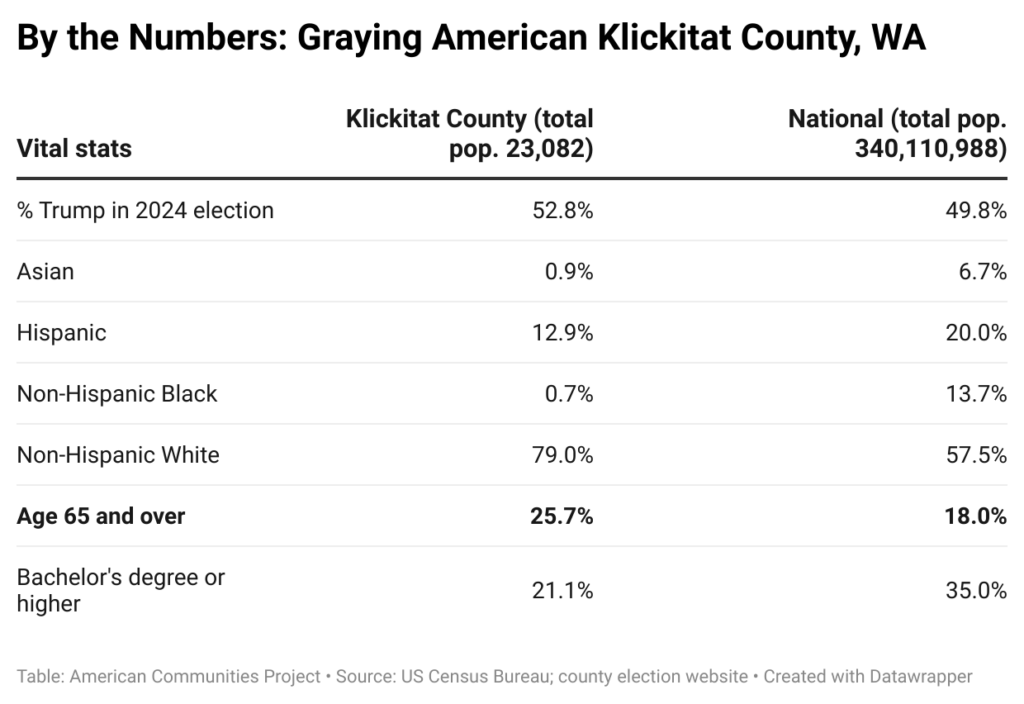After Six Months of Trump 2.0, Residents Open Up About Impacts Where They Live
Editor’s note: Since 2018, we have connected with many residents across the country for our work, supported by the Robert Wood Johnson Foundation. This summer, we asked community members to articulate what’s been happening where they live since President Trump took office in January. Some asked for anonymity for safety concerns. We thank all those who shared their views and experiences for this story.
More than six months into President Donald Trump’s second term, the consequences of his administration’s policies and practices have been stacking and far-reaching. The food system, education, health, and well-being sectors have been hit hard, and anxiety over new hardships keeps surfacing and cresting as the “Big, Beautiful Bill” takes effect. Economic uncertainty is tangible. Immigrants, LGBTQ+, children, elders, veterans, and college residents are heavily bearing these consequences, often in the shadows.
We share perspectives from community members in rural, suburban, and urban community types in nine states from coast to coast: Oregon, North Dakota, Kansas, Texas, Minnesota, Wisconsin, Michigan, North Carolina, and Virginia. Some areas will be in the political spotlight in the coming months. The Cook Political Report rates the 2026 U.S. Senate races in Michigan and North Carolina as toss ups and Minnesota as lean Democrat. The nonpartisan analysis group rates U.S. House races in some of these places as competitive in 2026; including OR-05 and TX-28 as lean Democrat; WA-03, TX-34, and MI-07 as toss ups; and VA-02 as lean Republican. (Click on the links below to jump to specific place vignettes.)
Columbia River Gorge Region, including Hood River County, OR (Exurb) and Klickitat County, WA (Graying America)
Morton County, ND (Exurb)
Gove County (Aging Farmland) and Johnson County (Exurb), KS
Texas, including Dallas and Tarrant counties (Big Cities)
Hennepin County, MN (Big City)
Langlade County, WI (Rural Middle America)
Oceana County, MI (Rural Middle America)
Ingham County, MI (College Town)
Anson County, NC (African American South)
Virginia Beach City, VA (Military Post)
Columbia River Gorge Region, including Hood River County, OR (Exurb) and Klickitat County, WA (Graying America)
According to residents in the Columbia River Gorge Region, comprising Hood River, Wasco, and Multnomah counties in Oregon and Skamania, Klickitat, and Clark counties in Washington: Among the immigrant, LGBTQ+, and Medicaid-dependent communities, there are pervasive stories of fear, anxiety, depression, stress, and uncertainty. This compounds the everyday worry that they carry with them being low-income, undocumented, from a mixed-status family, or being LGBTQ+.
LGBTQ+
Our transgender community is the most directly impacted by not knowing how or when they’ll be able to continue to get their healthcare. There’s brainstorming with some local healthcare providers who want to continue providing care for their patients but are now needing to follow federal guidelines not only on what they can provide in the way of care, but also what words they can actually say.
Individual clients and program participants who identify as LGBTQ+ have been telling their therapists, counselors, and community health workers about their fears and some have decided to remain in, or re-enter, “the closet” where their identity is hidden but they feel safer. One stated, “I’m not being seen as who I am, so I might as well not be.”
Other individuals say they don’t even feel safe with people who identify as LGBTQ+ allies since there have been instances when allies show their homophobia (at worst) or less aggressively, their lack of willingness to use someone’s preferred pronouns.
Immigrants
For our immigrant neighbors, the stories are equally and more heartbreaking. Many can’t believe that after decades of years in this country, working, paying taxes, and being law abiding, that they are targets for deportation. They would like nothing else but to have their legal status and security and stay in the U.S. providing for their families.
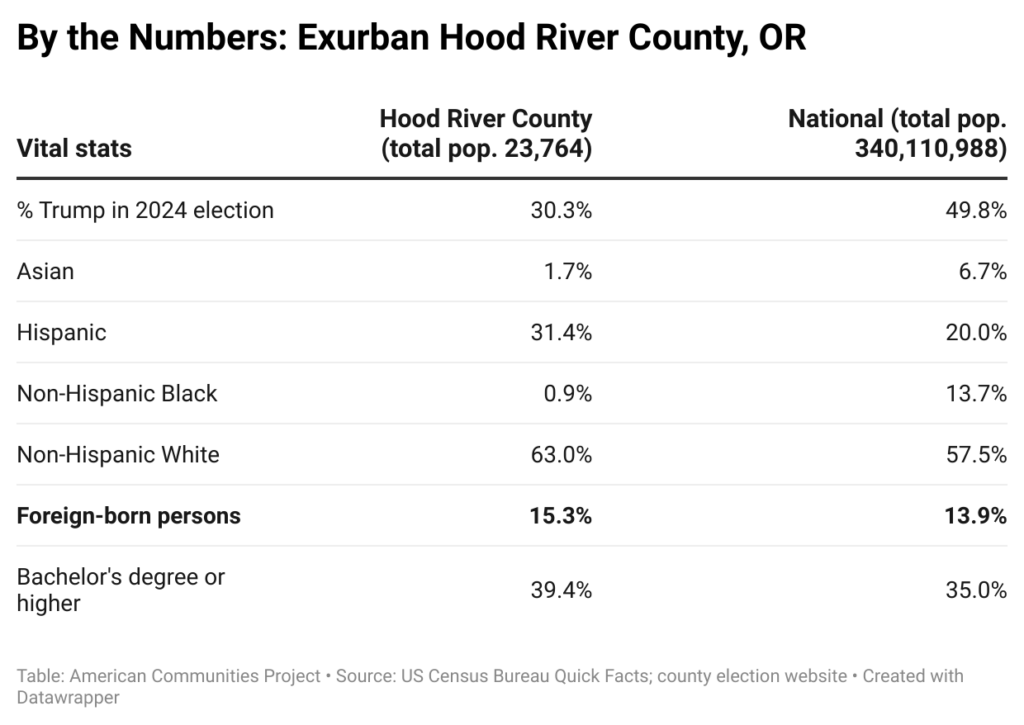 ICE has been on the Oregon side of the Gorge three times and picked up three individuals. There are GoFundMe campaigns for each. One was picked up after dropping his daughter off at a local elementary school. This family had to re-home their dog because they couldn’t care for her anymore after the father was taken away. The myriad impacts on the children are immeasurable. Last week, they didn’t get the person they were after, but caused widespread panic and the decision by organizations to cancel events in order to keep people safe.
ICE has been on the Oregon side of the Gorge three times and picked up three individuals. There are GoFundMe campaigns for each. One was picked up after dropping his daughter off at a local elementary school. This family had to re-home their dog because they couldn’t care for her anymore after the father was taken away. The myriad impacts on the children are immeasurable. Last week, they didn’t get the person they were after, but caused widespread panic and the decision by organizations to cancel events in order to keep people safe.
Not only are people staying inside and not venturing out due to overwhelming fear of ICE coming to get them, detaining them, and deporting them, there are stories of victims of crime (like domestic violence and harassment) who are not making reports out of fear that the police will alert ICE. People are skipping doctors’ appointments, not bringing their kids to activities, camps, playdates, and sometimes school, not going grocery shopping, and not going to church, and sometimes not going to work. Imagine staying inside all day long only to fall asleep to nightmares. Some have expressed feelings of not being able to stand much more of this fear and are considering suicide. Community Health Workers are stressed and depressed, as they are being inundated with these real-life stories and are helpless to help.
Even as these heartbreaking stories unfold, it’s a bountiful year for the cherry orchards of Oregon and Washington. However, the workforce is not present to harvest. Migrant farmworkers have been traveling north to help with the June cherry harvesting season in the Gorge for decades, but fears of immigration enforcement have kept them south this year. Orchardists are only seeing 50% of the workforce return, which may cause some farms with thin margins to go bankrupt.
Oregon Public Broadcasting’s Sheraz Sadiq summarized what Ian Chandler, chair of the Oregon Sweet Cherry Commission and co-owner of CE Farm Management, said on his broadcast June 24. “The fear of potential enforcement activity led to a 50% reduction in available workers for most cherry farmers in the region at the start of harvest two weeks ago.” (Chandler is married to a Mexican immigrant, which he addressed in the interview.)
Hood River made the Trump administration’s list of sanctuary jurisdictions “defying federal immigration law” and obstructing deportation. Oregon has the oldest state-level sanctuary law in the country, passed in 1987. It prohibits state and local governments from assisting in federal immigration enforcement without an order from a judge. The state strengthened those protections in 2021 and rolled out a Sanctuary Promise Community Toolkit about a month before Trump returned to the White House.
On ICE raids, Hood River’s Mayor Paul Blackburn said: “Since 1987, Oregon has been a sanctuary state. It is against Oregon law for state and local law enforcement (including state police, city police, and county sheriff) to participate in immigration enforcement without a judicial warrant. While we cannot predict when or how federal agents might operate in Hood River — and our ability to protect our neighbors is limited — local law enforcement will not aid them. I want to emphasize this message: our police do not cooperate with ICE without a warrant from a judge. That said, the threat remains very real for undocumented community members, and unfortunately, local officials cannot shield you from federal action.” The Hood River Latino Network is providing legal aid to those with mixed documentation.
On the Washington side of the river where we live, Sheriff Songer in Klickitat County is cooperating with ICE, against Washington state law.
In past years, everyone was dancing and having fun at Battle of the Bands in Hood River, an annual event where Latino musicians compete against each other for prizes. This year, it was very subdued (as was the July Fourth parade in Hood River), with few dancing and only children coming to tables and booths to chat, since parents were out but too afraid to approach tables, even those of organizations that they have trusted in the past.
Medicaid
Regarding cuts to Medicaid, there are some preliminary numbers, but we don’t know how this will play out on our community level yet.
SNAP cuts
On the big bill enacted in July, Partners for a Hunger Free Oregon said: “The U.S. House of Representatives voted to pass a cruel reconciliation bill that guts the Supplemental Nutrition Assistance Program (SNAP) — a lifeline for over 700,000 Oregonians. This bill slashes $160 a month from a typical family’s food budget, strips food assistance from 108,000 people in Oregon, and devastates access to free meals in our schools and childcare centers. This isn’t about fixing fraud. It’s about taking from those with the least to protect those with the most. And it will hurt rural towns, low-income households, and communities of color the hardest. This bill doesn’t solve a problem — it creates one. It’s a calculated decision to take food off the tables of people who are already struggling.”
Resilience
The many peaceful protests that our community has held and the groups getting more organized to fight for justice and community health have buoyed community members. During the Hands Off protest on April 5, protesters took over downtown Hood River! More recently, many participated in the No Kings rallies on June 14 and the Good Trouble rallies on July 17. These protests were not only in Hood River, but all over the mid-Columbia Gorge, including Stevenson and White Salmon in Washington and The Dalles in Oregon.
Morton County, ND (Exurb)
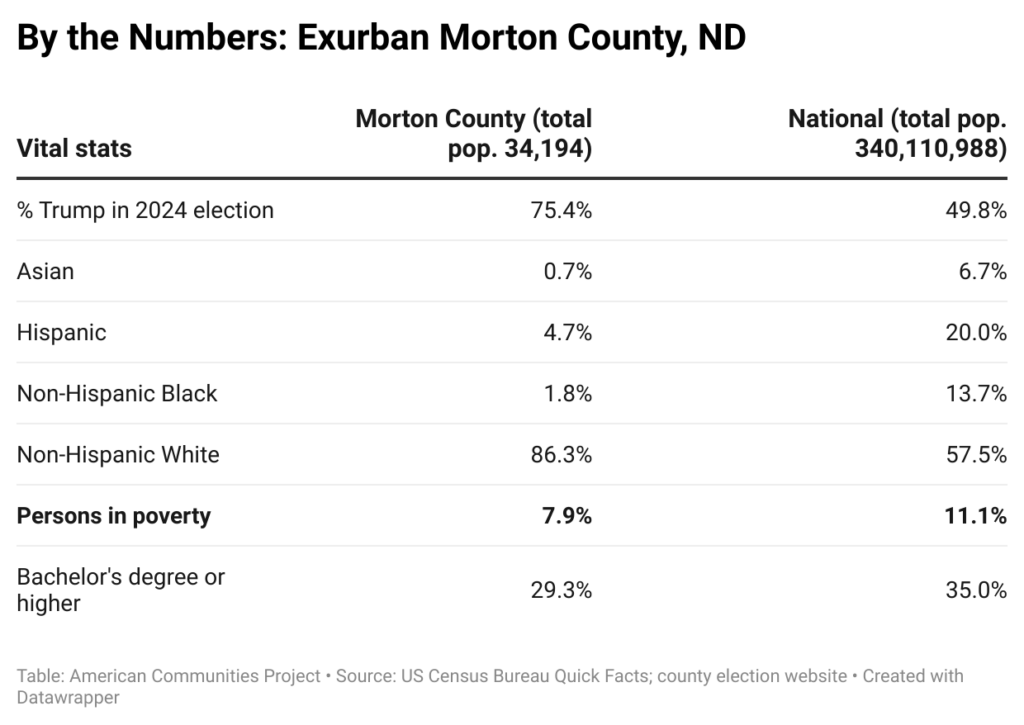 John Saiki, Morton County Engineer, writes: All is well. Regarding impacts, there are the usual increases. Our pavement marking costs, for example, are up about 11% this year, which is much better than we saw two or three years ago. Bridge and concrete box culvert prices are stabilized. With all the money from the federal government back in 2022, we were priced out of the market.
John Saiki, Morton County Engineer, writes: All is well. Regarding impacts, there are the usual increases. Our pavement marking costs, for example, are up about 11% this year, which is much better than we saw two or three years ago. Bridge and concrete box culvert prices are stabilized. With all the money from the federal government back in 2022, we were priced out of the market.
In 2022, all levels of government were receiving money: cities, counties, and state, and receiving it all at once. We had a certain amount of money that we had budgeted and distributed from the federal government. When we started bidding projects, the bids came in 40% to 80% over our estimates. Much of that increase was due to the limited number of suppliers and contractors in our area. Contractors could be selective in their work and bid more aggressively on large higher profit jobs, as opposed to our smaller bridge replacements. Long lead times required by suppliers also contributed to the higher costs. This pushed project completion out a year over what we specified in the bid documents. As a result, we rejected all the bids for work for 2022 and 2023.
While we are still not getting as much return for our dollar today, we are doing much better than two or three years ago. The cost of new equipment is still a concern as our fleet continues to age.
Much of the federal funding as well as state funding is being distributed by grants as opposed to a formula for disbursement. We are a rural county and often cannot fulfill the requirements the various government entities are looking for in awarding grants.
Life in Morton County is very much like it has always been. I recently attended the July Fourth parade on Main Street in Mandan. Everyone I talked to and passed while walking around seemed very upbeat and enjoying themselves. It was an event that made me proud to be living in this area.
Gove County (Aging Farmland) and Johnson County (Exurb), KS
Virginia Beesley writes: My friends in Gove County are concerned and fearful of the changes Trump has wrought. As am I. However, our family there are mostly concerned with the horrors of Biden’s policies and support Trump’s changes.
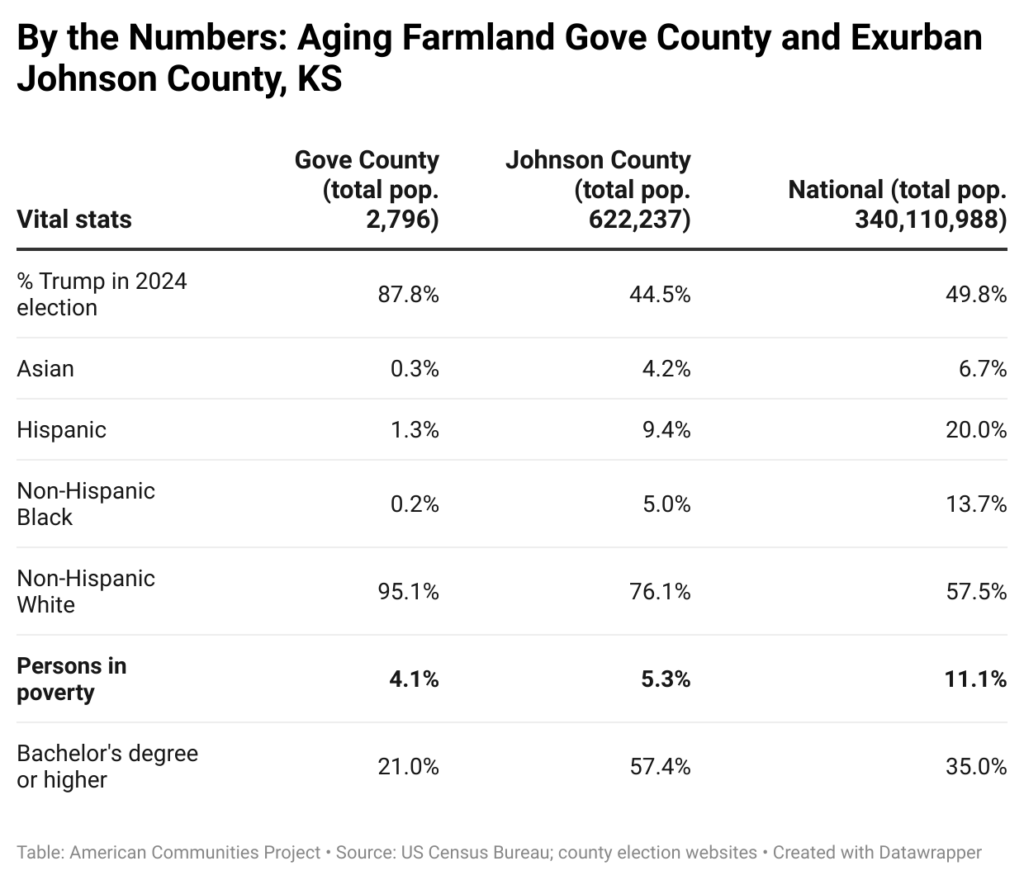 Johnson County where I now reside is not an Aging Farmland county, but an Exurb populated to some degree by the sons and daughters of those Aging Farmlands. In this county on Saturday, I encountered groups of sign-wielding, smiling “protestors” at the county’s largest farmers market, upset about Trump’s immigration, tariff, and tax changes. Today I chatted with a neighbor proudly wearing her Trump T-shirt as she weeded the garden that sits next to the gates to her mansion (I kid you not!). She seemed most concerned with the families she sees who use government help to buy groceries. She’s worked for everything her whole life and thinks that freeloaders are ruining our country. She said she gets so upset by what she sees on the news about these people that she has to turn off the program.
Johnson County where I now reside is not an Aging Farmland county, but an Exurb populated to some degree by the sons and daughters of those Aging Farmlands. In this county on Saturday, I encountered groups of sign-wielding, smiling “protestors” at the county’s largest farmers market, upset about Trump’s immigration, tariff, and tax changes. Today I chatted with a neighbor proudly wearing her Trump T-shirt as she weeded the garden that sits next to the gates to her mansion (I kid you not!). She seemed most concerned with the families she sees who use government help to buy groceries. She’s worked for everything her whole life and thinks that freeloaders are ruining our country. She said she gets so upset by what she sees on the news about these people that she has to turn off the program.
Both counties are divided. I do not get the sense that many people have personally been affected by what has happened these last six months, but there is a feeling that we will soon be negatively affected: that prices will rise, that floods will occur and help won’t be available, or that the people we count on to provide crucial services won’t be available. The storm is there in the sky, building higher and darker.
Texas, including Dallas and Tarrant counties (Big Cities)
W. Stephen Love, President and CEO of Dallas-Fort Worth Hospital Council, writes: Texas leads the nation in medically uninsured, and some estimates are that an additional 430,000 individuals will lose Medicaid coverage by 2034. In 2023, Dallas County’s Medicaid coverage was 14.8% and Tarrant County, containing Fort Worth, was 13.3% versus the 17% statewide average, according to Georgetown University’s McCourt School of Public Policy. Modeling the new law’s impact will take a little more time as the state-directed payment determination plus the approximate two-year delayed implementation time frame for some of the bill’s components need to be determined by Health and Human Services.
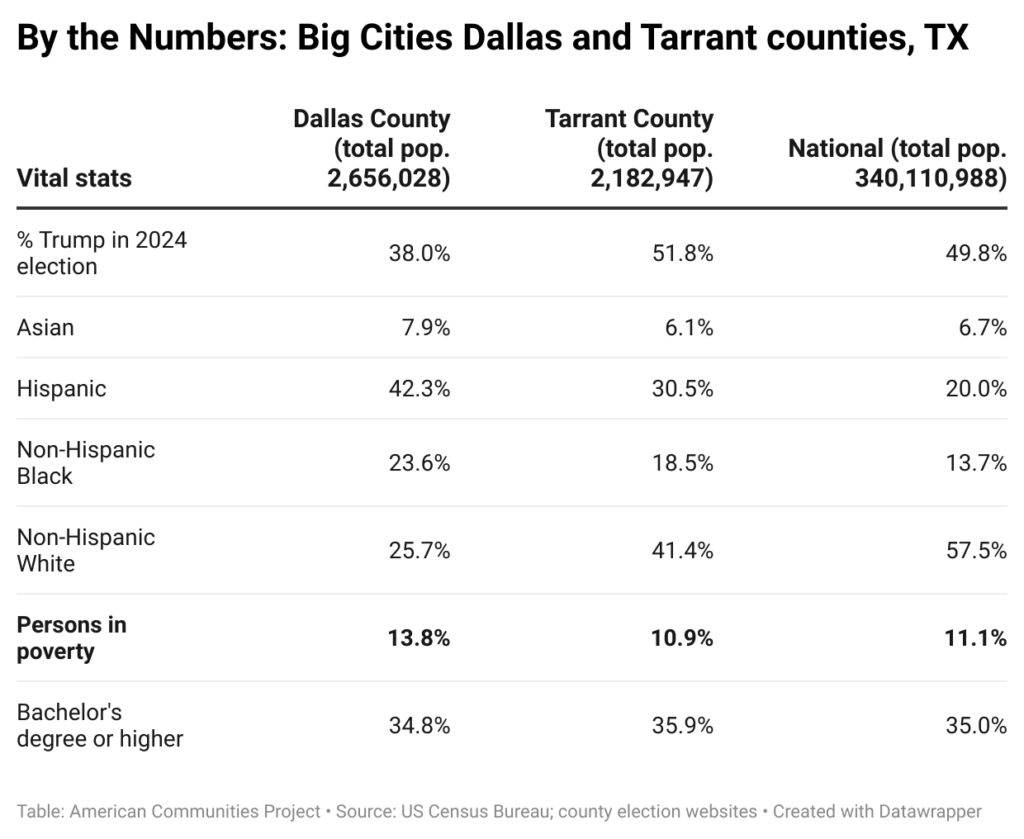 A major concern not addressed in the new law: The enhanced premium tax credits for Affordable Care Act health plans expire at year’s end unless Congress renews them. Since Texas did not expand Medicaid, many Texans use these tax credits to assist in securing health coverage in the federal health marketplace. If these credits are not renewed and the enrollment process shortened, some estimate that approximately 1.5 million Texans could lose healthcare coverage, which would be quite serious for all providers. Congress must renew these enhanced premium tax credits to help individuals secure healthcare coverage.
A major concern not addressed in the new law: The enhanced premium tax credits for Affordable Care Act health plans expire at year’s end unless Congress renews them. Since Texas did not expand Medicaid, many Texans use these tax credits to assist in securing health coverage in the federal health marketplace. If these credits are not renewed and the enrollment process shortened, some estimate that approximately 1.5 million Texans could lose healthcare coverage, which would be quite serious for all providers. Congress must renew these enhanced premium tax credits to help individuals secure healthcare coverage.
The Texas Medicaid program generally covers low-income beneficiaries, including pregnant women, postpartum coverage, disabled individuals, children, and some seniors in long-term care. Therefore, work requirements might affect some, but most would have an exemption from that part of the law.
The new law does not postpone the reduction in Medicaid disproportionate reimbursement and most estimates reflect $778 million funding will be lost by Texas in 2026. The new law sets aside $50 billion for rural health transformation to be spread in increments of $10 billion over five years for the entire United States. The initial calculation will have 50% of the annual payments divided equally between the participating states. This disadvantages Texas, but hopefully the rural intensity will help Texas increase its share in the remaining portion.
Texas has many rural hospitals, and Medicaid is a large part of the patient population, so this funding will help but may not cover the shortfall for hospitals. Many rural hospitals already deal with cash flow issues, uncompensated care, and diminishing margins. Some might reduce services or close which affects all in the community, not just Medicaid beneficiaries. Many rural hospitals are the largest employer in the community, so cutting services or closing the facility could have a negative economic impact within the region.
Hennepin County, MN (Big City)
Edgar Oliveira writes: I finished school in May and have been working as a full-time therapist in a Minneapolis suburb. I work almost exclusively with Medicaid patients as a psychotherapist. Most of my patients live in poverty, face chronic hardship, and carry the weight of tragic lived experiences. For these individuals, Medicaid is not just insurance — it’s a lifeline. I’ve witnessed clients gradually heal, find employment, regain stability, grow, and change — often after many arduous hours of therapy made possible only through Medicaid support.
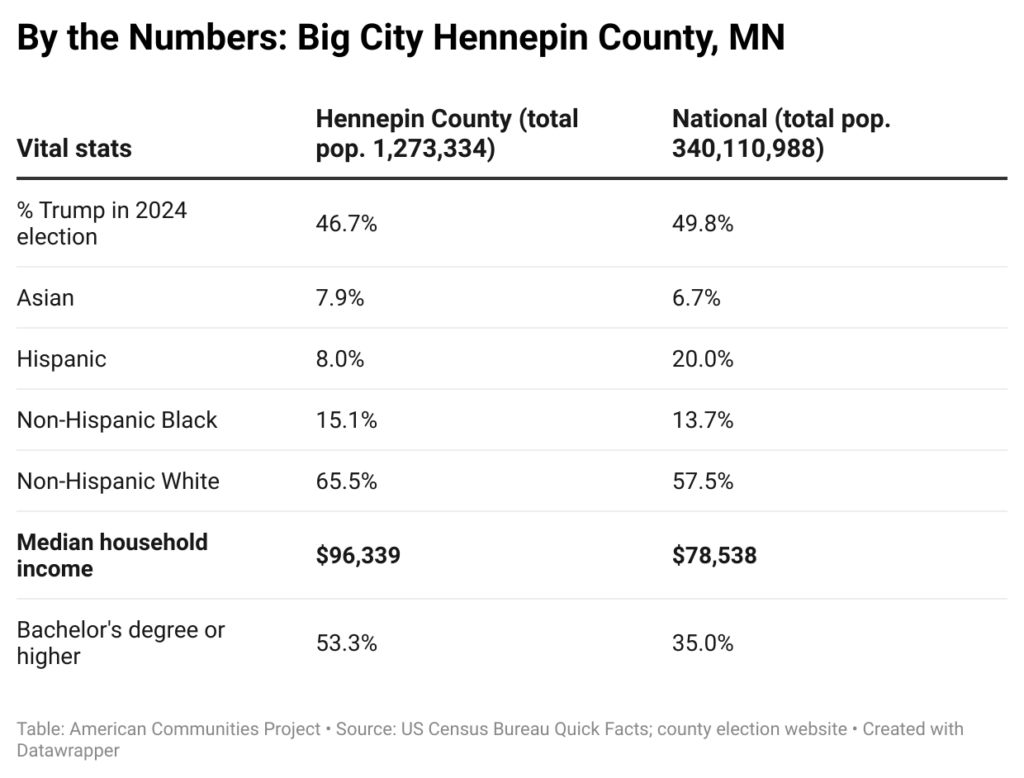 Lately, however, not a day goes by without someone asking how long they’ll still be covered. The anxiety is palpable. Patients wonder whether their services will be cut, or whether their diagnoses — autism, schizophrenia, bipolar disorder — might suddenly be excluded from coverage. There’s a wide range of opinions: Some colleagues reassure me that only “administrative costs” are being reduced, while others fear that essential services are next. I’m scrambling to understand the real implications of these changes, but I don’t yet feel confident that I do.
Lately, however, not a day goes by without someone asking how long they’ll still be covered. The anxiety is palpable. Patients wonder whether their services will be cut, or whether their diagnoses — autism, schizophrenia, bipolar disorder — might suddenly be excluded from coverage. There’s a wide range of opinions: Some colleagues reassure me that only “administrative costs” are being reduced, while others fear that essential services are next. I’m scrambling to understand the real implications of these changes, but I don’t yet feel confident that I do.
Personally, I’ve experienced a very nuanced shift in my sense of safety. Internally, I’ve moved toward a more careful, defensive posture. Painfully, I’ve begun to wonder whether some of the people closest to me are truly in agreement with my right to be here — I am a naturalized citizen.
What I hear in anti-immigrant sentiment is a simple, devastating message: Get out. The result of hearing this is shame. And shame often gives rise to defensive fantasies: fantasies of violence, of isolation, of cutting ourselves off before we can be cast out, or of finding an omnipotent protector. This, to me, is a deeply familiar psychological pattern. It’s what I see every day in my office — people who, from an early age, experienced being excluded, hated, or demonized by others. When fundamental needs for attachment go unmet, shame flourishes in silence, and we retreat or fight back in ways that feel self-protective — but ultimately deepen the wound. We are inseparable from our need for inclusion and connection.
Langlade County, WI (Rural Middle America)
Donna Kallner, a folk artist and writer, reports: In this part of rural northern Wisconsin, many of my neighbors have spent nearly a decade echoing and amplifying talking points on immigration, election security, abortion, transgender athletes, the price of gas, and keeping America out of foreign wars. I can’t say I think those positions have changed, but the volume seems somewhat lower.
And I am hearing concerns, particularly about how families who rely on Badgercare (Wisconsin’s name for Medicaid) will manage if they lose coverage. Framing those as cuts of “waste, fraud, and abuse” is deeply offensive to people who work hard to get by despite the challenges of physical or cognitive disabilities, chronic illness, or caregiving responsibilities.
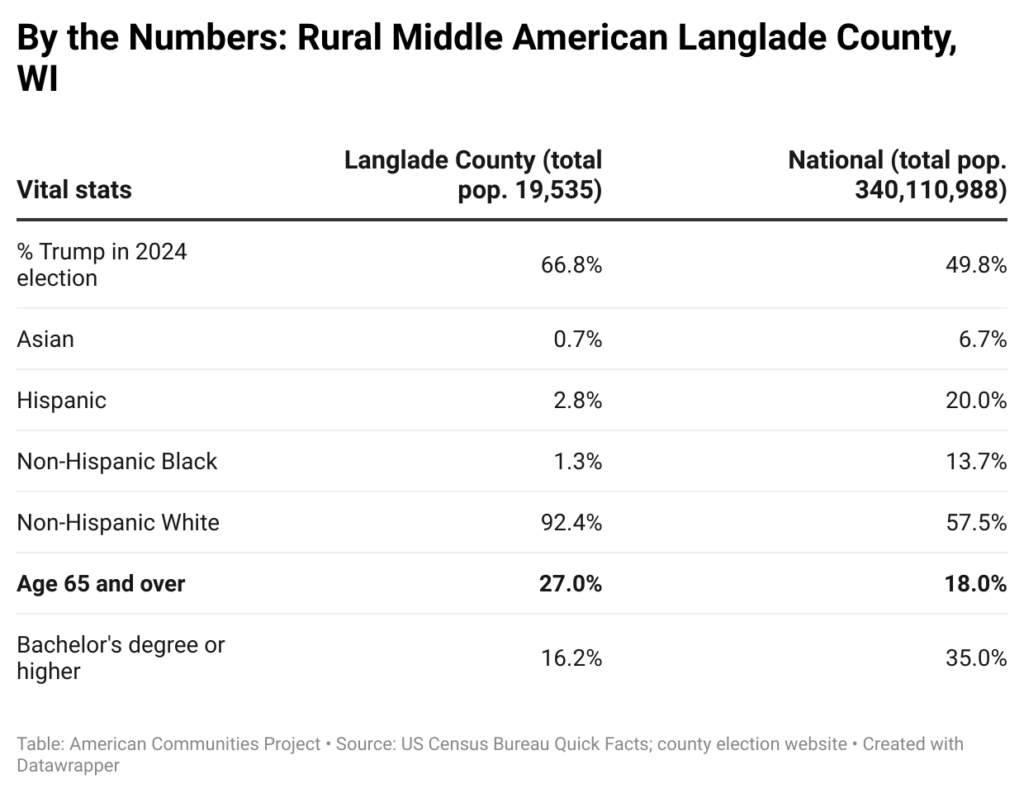 Cuts to Medicaid assistance for long-term care will further challenge my community. There’s already a high volume of emergency medical service calls to older residents, including “lift assists” for which the service cannot bill insurance. More than a quarter of Langlade County is 65 or older. Without Medicaid assistance, many will have little choice but to age in place the best they can — using our limited ambulances and emergency medical personnel where skilled nursing care would be more appropriate and probably more cost effective.
Cuts to Medicaid assistance for long-term care will further challenge my community. There’s already a high volume of emergency medical service calls to older residents, including “lift assists” for which the service cannot bill insurance. More than a quarter of Langlade County is 65 or older. Without Medicaid assistance, many will have little choice but to age in place the best they can — using our limited ambulances and emergency medical personnel where skilled nursing care would be more appropriate and probably more cost effective.
I will just add one thought about tariffs: It seems like many people (including us) bought vehicles and major appliances ahead of tariffs, skewing perceptions of consumer confidence. I can’t say I see a lot of confidence. But there wasn’t a lot of confidence before, either. People who were struggling are still struggling, and it sure doesn’t feel like there’s an end in sight. But there’s always someone to blame and a lot of people making money in the outrage economy. I don’t know what it will take to get people to look away from the distraction peddlers.
In the meantime, our problems metastasize, becoming even harder to address. It feels like we have learned nothing from history.
Oceana County, MI (Rural Middle America)
Irma Hinojosa writes: I live in a small rural town in Oceana County. It has been a difficult six months with the new presidential administration running our country. The constant postings on social media, the news reports, and people’s racial slurs are just some of the things that have been making the last six months difficult for undocumented individuals or just being brown skinned of Latino decent.
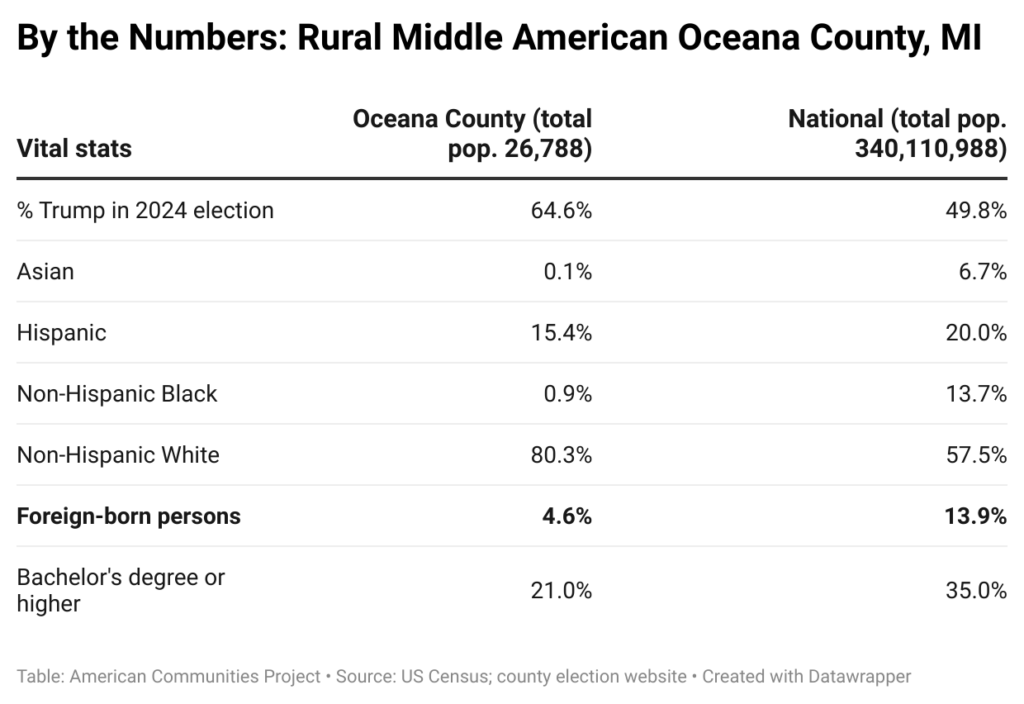 Our small community has not seen ICE raids, but we have seen more police stopping Latinos. People who are undocumented are keeping a low profile and limiting their time out and about. They are sticking to going to work and coming home and not venturing anywhere else. The common feeling is fear. The fear of being stopped by police; the fear of there being an ICE raid at work; the fear of their rights being violated; and the biggest fear of being taken away from their families.
Our small community has not seen ICE raids, but we have seen more police stopping Latinos. People who are undocumented are keeping a low profile and limiting their time out and about. They are sticking to going to work and coming home and not venturing anywhere else. The common feeling is fear. The fear of being stopped by police; the fear of there being an ICE raid at work; the fear of their rights being violated; and the biggest fear of being taken away from their families.
Regardless of documentation, we all have constitutional rights that are being violated and disregarded. We forget that these people feed us by harvesting fruits and vegetables; build our homes and businesses by working long hard hours in construction; and clean hotels, private homes, and businesses so they can run efficiently.
This administration has brought fear, disrespect, and anguish to many individuals. It has caused people to feel superior to us and disrespect us simply because we are brown skinned.
There are many people in our community who see this and want to help, but that help sometimes seems hopeless because there isn’t much they can do to stop an ICE raid if they have proper documentation.
As the chairperson of our local Hispanic center, I want to reduce the fear, and I want to bring peace of mind, value, trust, and respect to our local community. We have done workshops to help people know their constitutional rights and are ready to assist individuals in a time of need.
I wish our undocumented community had an easier path to legal residence. Many families have been in our community for 20-plus years. They pay taxes, they own homes, they support our economy, and their children are in our schools. After all those contributions to our society, why are they still struggling and having to deal with an administration based on superiority, bringing fear and disrespect, and being treated like the worst part of our society? I just can’t wrap my head around that!
Ingham County, MI (College Town)
Dante Chinni writes: Ingham County has several identities. It is home to Michigan’s state capital. It’s a mid-sized manufacturing hub. But its strongest identity is being home to Michigan State University and its 52,000 students in East Lansing. And as a “college town,” it is facing uncertain times.
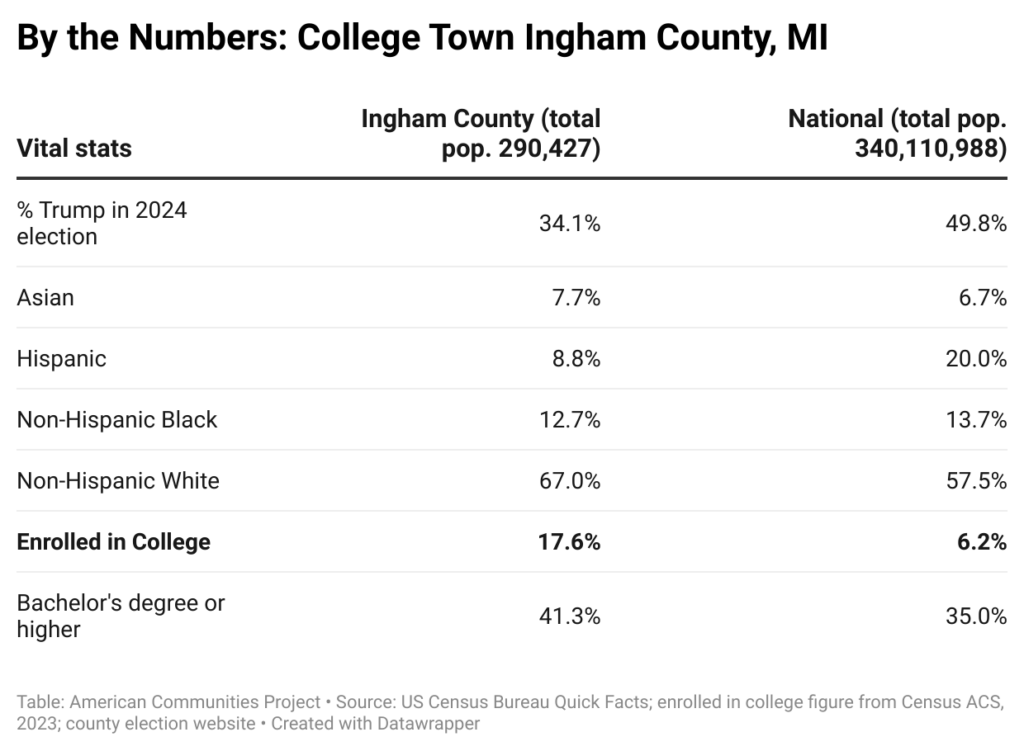 The American Communities Project visited East Lansing in April to ask students how they felt about their futures and the future of the country. The comments we heard were disheartening. Many students told us they had received emails about cuts to grants that meant they would no longer have summer research work — in everything from cancer research to art history. And the cuts hit in unexpected ways. Fulbright scholars were left uncertain month-to-month about whether they would receive the stipends that they needed to live their lives. (Thankfully those payments ultimately came through.)
The American Communities Project visited East Lansing in April to ask students how they felt about their futures and the future of the country. The comments we heard were disheartening. Many students told us they had received emails about cuts to grants that meant they would no longer have summer research work — in everything from cancer research to art history. And the cuts hit in unexpected ways. Fulbright scholars were left uncertain month-to-month about whether they would receive the stipends that they needed to live their lives. (Thankfully those payments ultimately came through.)
But since then, the challenges have continued and deepened. The university has seen more than $80 million in cuts in federal grants. Those grants helped fund research in a broad range of areas that will now not be done or will be scaled back dramatically. Those cuts are just part of a bigger challenge the school is facing as inflation has run up the costs of daily operations, and Republicans in the statehouse have proposed cutting state higher education funding even more. As a result, the school is now looking at 6% budget cuts this fiscal year and another 3% the following year.
And, of course, as a College Town and home to the state government, Ingham is the kind of community where there is a deeper dismay about the current administration. Democrat Kamala Harris carried Ingham by about 30 percentage points in the 2024 presidential race. And in July someone painted “The Rock,” a massive, free-speech boulder in the middle of campus, with a simple two-word message: Dump Trump.
Anson County, NC (African American South)
Alban Burney writes: There is an interesting shift that is occurring in the Wadesboro community. Since our last conversation, the town has hired an African American town manager, elected an African American mayor, and brought back a retired African American police chief who replaced a Caucasian police chief who resigned from the job. It is also worthy to mention that the Mayor Pro Tem is also African American. Therefore, the town leadership has become more diverse.
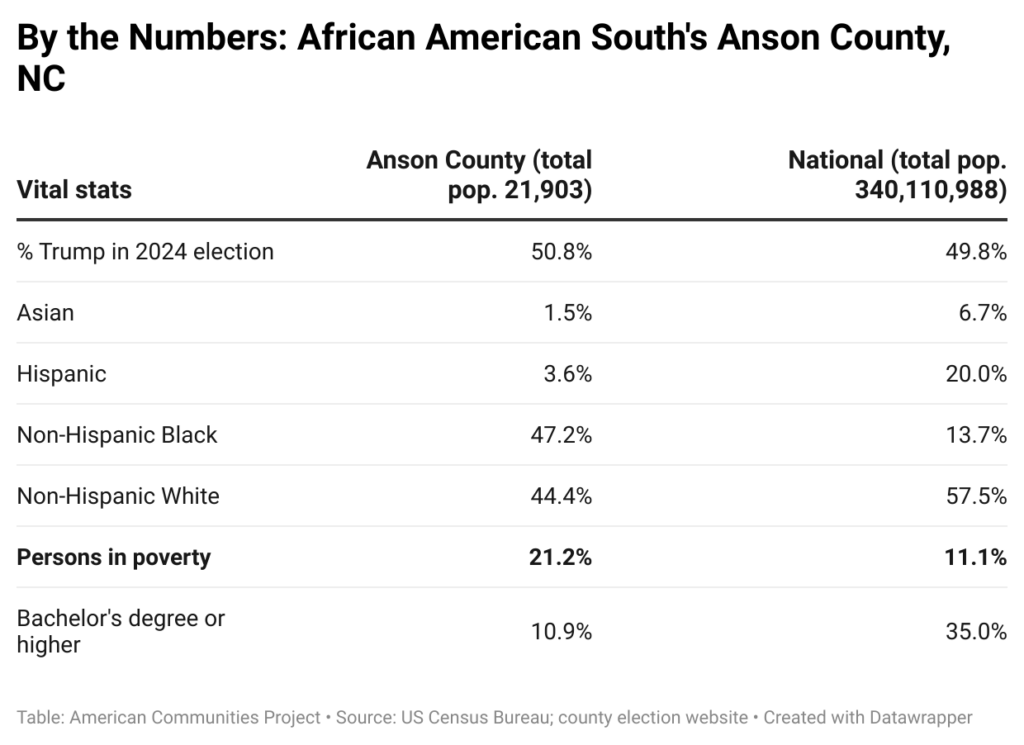 However, with that diversity comes its own set of challenges. It is my sense in reading some social media posts of Caucasian residents of Wadesboro that they are not happy with this shift in the diversity of town leadership.
However, with that diversity comes its own set of challenges. It is my sense in reading some social media posts of Caucasian residents of Wadesboro that they are not happy with this shift in the diversity of town leadership.
With all this being said, we are seeing people siloing overall than coming together. Therefore, there is more silence than anything. We have not seen immigration raids in the community. The closest we have seen raids is in Kings Mountain, N.C. Tariffs have had an impact as giving at the church continues to be down as people are saving their money to buy grocery and pay for medicine.
Finally, I think there is a sense of both hope and fear that is prevalent.
Virginia Beach City, VA (Military Post)
Brittany Horn, Director of Joint-Use Library at Tidewater Community College, writes: The community, which is deeply tied to the military, has missed out on the some of the biggest challenges, but many concerns remain. The impacts of the Trump administration are not as heavily felt as in other communities, but the things my family, friends, colleagues, and I are most concerned about include the following:
- Loss of federal funding for healthcare, education, art, science, and social programs (SNAP, Medicaid/Medicare, Veterans Affairs, FEMA, Federal Student Aid, and so much more)
- Increased discrimination against minorities, LGBTQIA+, non-Christians, women, and people with disabilities
- Changes to standards and accreditation for education from K12 through higher ed and healthcare (including vaccines)
- Impacts on federal workers, including military and contracted personnel working on any of the bases in Hampton Roads
- Militarization of police, including ICE sweeps and lack of due process
- Decreased action to prevent climate change resulting in catastrophic weather events (Hampton Roads is subject to hurricanes every year)
- Erosion of separation of powers and oversight capabilities of the three branches of government
- Increased sense of danger of living in an area with so much military activity, potentially being targeted by an enemy
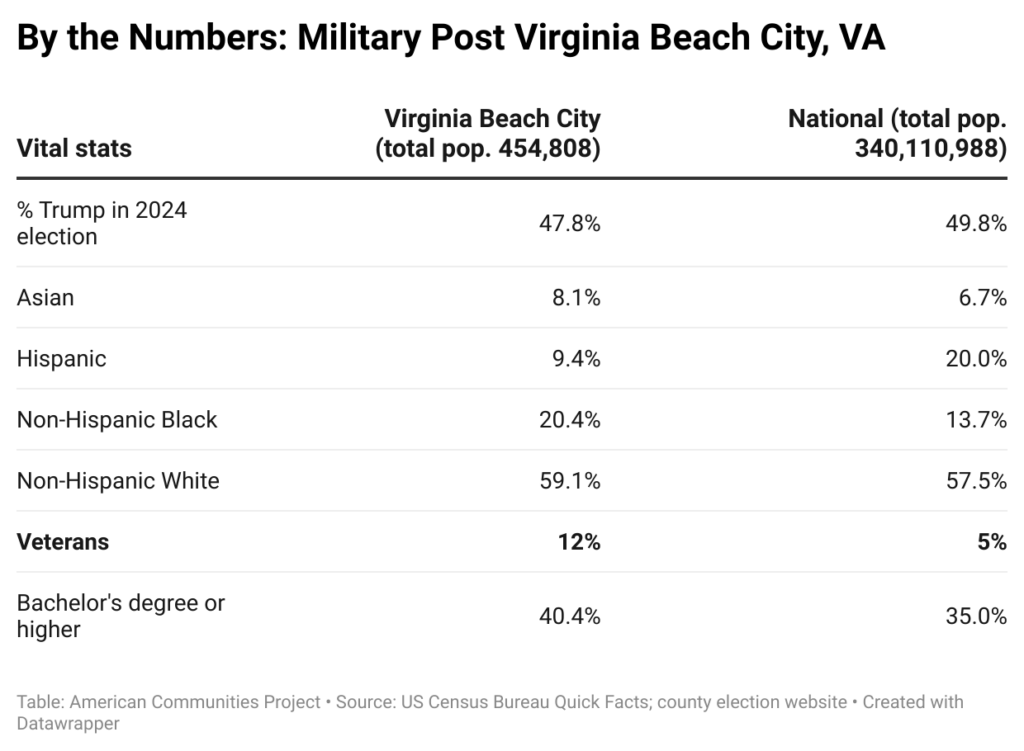 Although I am not personally connected to anyone in the military, the Hampton Roads economy heavily relies on the bases, the military members and families who make up a significant amount of the population, and the businesses that provide support for the bases and people. The “Big, Beautiful Bill” has plenty of funding for the military-industrial complex, so this region may see some benefits, but as someone who cares more about people than bombs and submarines, I ask, “At what cost?”
Although I am not personally connected to anyone in the military, the Hampton Roads economy heavily relies on the bases, the military members and families who make up a significant amount of the population, and the businesses that provide support for the bases and people. The “Big, Beautiful Bill” has plenty of funding for the military-industrial complex, so this region may see some benefits, but as someone who cares more about people than bombs and submarines, I ask, “At what cost?”
For all the damage that has been done by this administration, what compounds the feelings of fear, anxiety, and anger for those of us on the left is the chaos and uncertainty of what is around the corner. There’s always a new group of people to be targeted, societal norm to be flipped, foreign leader to offend, and misinformation campaign to fight against.


